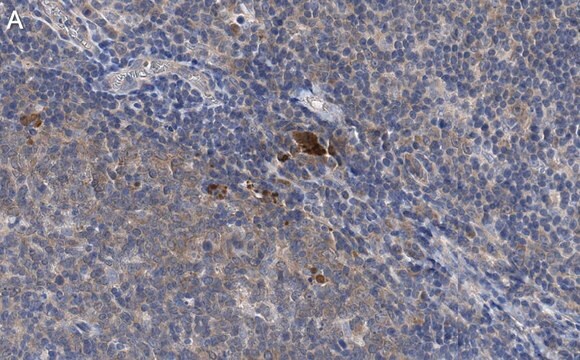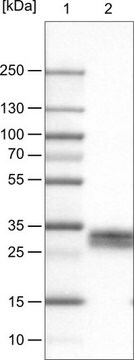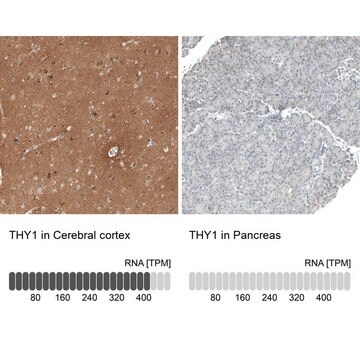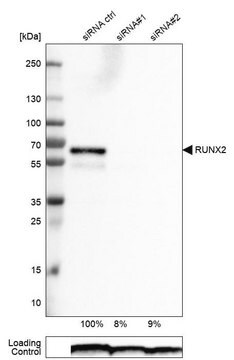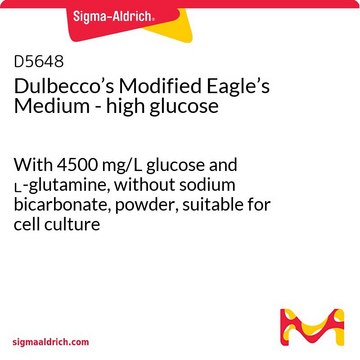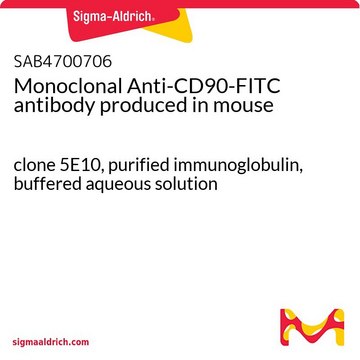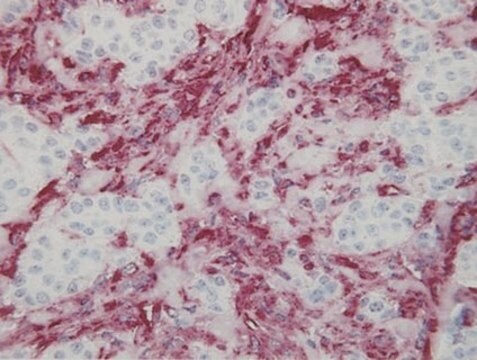SAB4200497
Anti-THY1 antibody, Mouse monoclonal
clone TH350, purified from hybridoma cell culture
Synonim(y):
Anti-CD90, Anti-CDw90, Anti-FLJ33325, Anti-Thy-1 T-cell antigen, Anti-Thy-1 antigen, Anti-Thy-1 cell surface antigen, Anti-thy-1 membrane glycoprotein, Monoclonal Anti-THY1 antibody produced in mouse
About This Item
Polecane produkty
pochodzenie biologiczne
mouse
białko sprzężone
unconjugated
forma przeciwciała
purified from hybridoma cell culture
rodzaj przeciwciała
primary antibodies
klon
TH350, monoclonal
Formularz
buffered aqueous solution
masa cząsteczkowa
antigen ~27 kDa
reaktywność gatunkowa
mouse, human, rat
stężenie
~1.0 mg/mL
metody
ELISA: suitable
flow cytometry: 20-40 μg/test using A549 cells.
immunohistochemistry: suitable
western blot: 2.0-4.0 μg/mL using NT2 total cell extracts.
numer dostępu UniProt
Warunki transportu
dry ice
temp. przechowywania
−20°C
docelowa modyfikacja potranslacyjna
unmodified
informacje o genach
human ... THY1(7070)
Opis ogólny
Thy-1 cell surface antigen (THY1) is a glycoprotein that is expressed on the membranes of adult cells, mesenchymal stromal cells and cancer cells. It has a molecular weight of about 25-37kDa. The gene encoding THY1 is localized on human chromosome 11q23.3.
Specyficzność
Immunogen
Zastosowanie
- immunoblotting
- flow cytometry
- immunofluorescence
Działania biochem./fizjol.
Postać fizyczna
Przechowywanie i stabilność
Oświadczenie o zrzeczeniu się odpowiedzialności
Nie możesz znaleźć właściwego produktu?
Wypróbuj nasz Narzędzie selektora produktów.
Kod klasy składowania
10 - Combustible liquids
Klasa zagrożenia wodnego (WGK)
WGK 2
Temperatura zapłonu (°F)
Not applicable
Temperatura zapłonu (°C)
Not applicable
Wybierz jedną z najnowszych wersji:
Certyfikaty analizy (CoA)
Nie widzisz odpowiedniej wersji?
Jeśli potrzebujesz konkretnej wersji, możesz wyszukać konkretny certyfikat według numeru partii lub serii.
Masz już ten produkt?
Dokumenty związane z niedawno zakupionymi produktami zostały zamieszczone w Bibliotece dokumentów.
Nasz zespół naukowców ma doświadczenie we wszystkich obszarach badań, w tym w naukach przyrodniczych, materiałoznawstwie, syntezie chemicznej, chromatografii, analityce i wielu innych dziedzinach.
Skontaktuj się z zespołem ds. pomocy technicznej